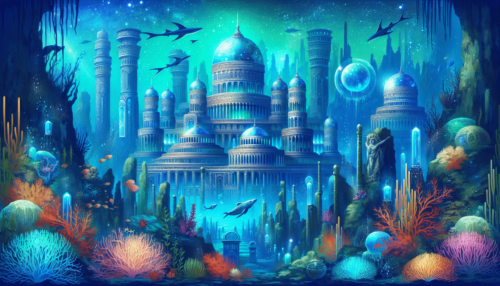- Introduction
- Plato's account of Atlantis
- Theories about the location (historical and current)
- Historical and geological evidence
- Current indications of the location of Atlantis
- Conclusion
1. introduction
In the fourth century BC, Plato first coined the legend of Atlantis, which he described as a powerful and advanced civilization located beyond the Pillars of Heracles [1]. Despite the fascinating description of the Atlantic as a utopia, founded by beings who were half gods, half men and an island full of gold, silver and exotic wildlife [2]the scientific community is largely of the opinion that Atlantis is a fictional concept, created by Plato for his philosophical work [1].
However, this view has not dampened the curiosity and imagination of many for centuries. The legend of Atlantis continues to inspire numerous theories about its location, be they historical or contemporary in nature [7]and stimulates debate about possible historical and geological evidence for its existence [5] [7]. Although its exact location remains unknown and its existence continues to be a topic of debate among scholars [8]the legend of Atlantis remains a symbol of the unknown, the mysterious and the unattainable that fascinates people all over the world [7].
2 Plato's account of Atlantis
- Plato's depiction of Atlantis:
- Plato's dialoguesThe story of Atlantis is presented in two of his last dialogues, Timaeus and Critias. In these dialogues, Plato describes Atlantis as a powerful and advanced civilization that dominated large parts of Europe and North Africa [11].
- The intention behind the storyIt is believed that Plato's Atlantis is a parable designed to illustrate the ideal state during war. The idea of Atlantis as a real place is a modern phenomenon, popularized in the 19th century by a failed American politician and perpetuated by various groups [11].
- The dialogs and their meaningPlato's dialogues, especially the Critias, contain complex themes without committing to a single interpretation. They aim to arouse interest, promote argumentative thinking and present different opinions without obligation [13].
- The story and its elements:
- The main playersThe Critias dialog features four speakers: Socrates, Timaeus, Hermocrates and Critias. The dialog focuses on a story told by Critias about ancient Athens and its war with the island of Atlantis [12].
- The traditionCritias' story is based on information that came from his grandfather, who in turn had heard it from the Athenian lawgiver Solon. Solon had learned the story from Egyptian priests during a trip to Egypt [12].
- The city of AtlantisAtlantis is described as a technologically advanced civilization that ruled over parts of Europe and Africa. The city had a central hill, fertile plains and was surrounded by rings of sea and land. The city also had a temple in honor of the sea god Poseidon, which was clad in silver and had an ivory roof [5].
- The lessons of history:
- The ideal governancePlato's idea of the ideal state is set out in his work "Politeia", where he argues that the state should be based on reason and knowledge and that rulers should be philosophers [11].
- The importance of reason and investigationPlato's philosophy emphasized the importance of reason and inquiry. He is known for his theory of forms, which states that there are eternal, unchanging and abstract forms or ideas that exist independently of the material world [11].
- The critical interpretation: The importance of the critical interpretation of Plato's Atlantis account is emphasized. It is emphasized that it is important to read and critically interpret Plato's account in its original form [16].
3. theories about the location (historical and current)
- Historical and current theories about the location of Atlantis:
- Historical theories:
- Heinrich Himmler believed in the existence of Atlantis and sent an expedition to Tibet in 1938 to find the last "superhumans" of Atlantis [1].
- Eberhard Zangger, a geoarchaeologist and publicist, proposed the Troy hypothesis, which states that Atlantis is a disguised version of the story of Troy [1].
- Ignatius Donnelly claimed in his 1882 book "Atlantis: The Antediluvian World" that Atlantis was an advanced civilization that planned the achievements of the ancient world [15].
- Charles Berlitz claimed that Atlantis was a real continent near the Bahamas that was destroyed by the Bermuda Triangle, a region in the Atlantic known for mysterious disappearances [15].
- Current theories:
- US geologist Martin Pepper suggests that the Greek island of Santorini, which is of volcanic origin, could be the site of Atlantis [7].
- Some researchers believe that Plato's Atlantis is actually the ancient Greek city of Helike, which was destroyed by an earthquake and tsunami in 373 BC [7].
- Robert Sarmast claimed to have discovered Atlantis in the Mediterranean using sonar, but his findings were rejected by experts who suggested that the structures he found were actually mud volcanoes [17].
- The island of Spartel, which existed around 20,000 years ago, is considered a possible location for Atlantis. However, new research shows that it was much smaller than previously assumed and sank around 13,000 years ago due to rising sea levels [19].
- Geographical hypotheses:
- Hypotheses about the location of Atlantis include south-eastern Europe and Asia Minor (Minoan civilization, Troy hypothesis, Asia Minor hypothesis, Balkans, Black Sea hypotheses, Helike hypothesis) [7].
- Other hypotheses suggest south-western Europe or North Africa (hypothesis group Iberia, Central Mediterranean hypotheses) [7].
- Theoretical evidence suggests that the location of Atlantis can be determined through scientific analysis and the original texts, as presented in the book "Emergency Atlantis" with the full original texts [18].
4. historical and geological evidence
- Interpretations and geological events:
- Some scholars interpret the legend of Atlantis as a metaphor for the Battle of Marathon in 490 BC. [5]. This suggests that the story of Atlantis may be based on real historical events that have been altered by oral traditions.
- The story could also reflect ancient Egyptian records of a volcanic eruption on the island of Thera around 1500 BC [21]. This volcanic eruption, together with earthquakes and tsunamis on the Aegean island of Thera in the late Bronze Age, may have provided the inspiration for the story of Atlantis [21].
- Modern discoveries:
- Robert Sarmast, an American architect, claims to have discovered Atlantis in the eastern Mediterranean, specifically off the coast of Cyprus [22]. His claim is based on sonar measurements that revealed structures similar to Plato's description of Atlantis, including walls and tombs in 1500 meters of water [22].
- The presumed location of Atlantis is on a rectangular plateau that sank around 11,000 years ago and is now 1.5 kilometers under the sea between Cyprus and Syria [22].
- Geological catastrophes and their connection to Atlantis:
- A massive earthquake and tsunami occurred in the Gulf of Cádiz around 12,000 years ago, which may have contributed to the sinking of Atlantis [19].
- The flood in the Black Sea may have been less catastrophic than previously thought, with the water level in the Black Sea before the flood being higher than assumed [23]. These findings could offer new perspectives on the possible locations and the actual size of Atlantis.
5. current indications of the location of Atlantis
- Discovery by research team:
- A team of researchers, divers and a filmmaker claim to have found Atlantis in the Atlantic Ocean off the coast of Andalusia, specifically between Chipiona and Sanlúcar in the Bay of Cádiz near the mouth of the Guadalquivir River [24].
- They discovered what they believe to be the remains of walls and concentric circles on the seabed that match Plato's description of Atlantis [24].
- Structural features of the discovery:
- A team of divers, led by José Manuel Ávila and Antonio Fernández, have been searching for Atlantis off the coast of Cádiz since 2013. They recently discovered "curious anomalies", which turned out to be "homogeneous structures made of blocks" [24].
- These structures form a wall with a length of 63 meters, a height of up to 4 meters and a thickness of 2.30 meters [24].
- The team also identified what they believe to be three separate wall structures, all in close proximity to each other, forming an amphitheater of sorts [24].
- Cautious interpretation of the results:
- Dr. Mercedes de Caso Bernal, a historian and maritime archaeologist from the University of Cádiz, urges caution and explains that so far they have only examined a quarter of the planned seabed area [24].
6. conclusion
Given the wide range of historical, geological and modern research, the mystery of Atlantis remains both a source of fascination and controversy. Despite the scientific community's skeptical stance on the actual existence of Atlantis, the evidence presented Theories and discoveries fueled human curiosity and the desire to explore the unknown. The legend of Atlantis serves not only as a testament to the human imagination and its drive to understand past civilizations, but also as a reminder of how Myth and reality can merge with each other in a fascinating way.
The implications of these debates and research extend far beyond the mere search for a sunken city. They challenge us to push the boundaries of our understanding of history, archaeology and geology and emphasize the importance of critical engagement with ancient texts and modern evidence. So while the search for Atlantis continues, this relentless research allows us to delve deeper into the mysteries of human history and underlines the ongoing importance of constantly challenging and expanding our knowledge.
Further questions and answers about Atlantis
What exactly is the legend of Atlantis?
The legend of Atlantis tells of an extraordinarily advanced island empire that supposedly sank completely into the sea in just one day and one night, losing all its inhabitants. This mystery has fascinated mankind for many centuries.
What did Plato report about Atlantis?
Plato described Atlantis as a sunny island, rich in flowers, fruits and forests, criss-crossed by rivers and ponds, which was home to both wild and tame animals. He even mentioned that there was enough food for the largest animals, such as elephants, giving the idea of an extremely fertile and livable place.
Where do researchers think Atlantis was located?
According to various theories, Atlantis is said to have been located on a rectangular plateau that sank around 11,000 years ago and could be found today around 1.5 kilometers below the surface of the sea between Cyprus and Syria. Sonar images indicate the existence of a large mound, ditches and ramparts, which are interpreted as possible remains of Atlantis.
YouTube
References
[1] – https://www.news.at/a/mythos-atlantis-8336154
[2] – https://www.nationalgeographic.com/history/article/atlantis
[3] – https://www.livescience.com/23217-lost-city-of-atlantis.html
[4] – https://en.wikipedia.org/wiki/Atlantis
[5] – https://www.worldhistory.org/atlantis/
[6] – https://medium.com/@chatgpt1209/decoding-the-mystery-any-truth-to-the-legend-of-atlantis-a5b95ad479ba
[7] – https://de.wikipedia.org/wiki/Lokalisierungshypothesen_zu_Atlantis
[8] – https://de.wikipedia.org/wiki/Atlantis
[9] – https://www.geo.de/geolino/mensch/1707-rtkl-atlantis-das-raetsel-um-die-versunkene-stadt
[10] – https://kalismabijoux.com/de/blog/amulets/atlantis-die-enthuellung-des-raetsels-und-seine-symbolik
[11] – https://www.youtube.com/watch?v=Ir6ZrmvGvaY
[12] – https://de.wikipedia.org/wiki/Kritias_(Platon)
[13] – https://platon-heute.de/platons-dialoge.html
[14] – https://www.grin.com/document/75081?lang=en
[15] – https://www.history.de/news/detail/sechs-theorien-ueber-das-geheimnisvolle-atlantis.html
[16] – https://vixra.org/pdf/1103.0041v1.pdf
[17] – https://www.scinexx.de/dossierartikel/auch-atlantis-theorien-koennen-untergehen/
[18] – https://www.expedition-atlantis.com/Expeditions-Report.html
[19] – https://www.spektrum.de/news/das-1001-atlantis/783696
[20] – https://www.derstandard.de/story/2000142245782/raetsel-um-legendaeres-walisisches-atlantis-vermutlich-geloest
[21] – https://www.britannica.com/topic/Atlantis-legendary-island
[22] – https://www.spiegel.de/wissenschaft/mensch/oestliches-mittelmeer-forscher-will-atlantis-entdeckt-haben-a-327913.html
[23] – https://www.scinexx.de/dossierartikel/sintflut-verschlang-atlantis/
[24] – https://www.costanachrichten.com/spanien/land-leute/versunkenes-atlantis-in-spanien-gefunden-neueste-entdeckungen-forscher-cadiz-chipiona-sanlucar-donellan-92557714.html












